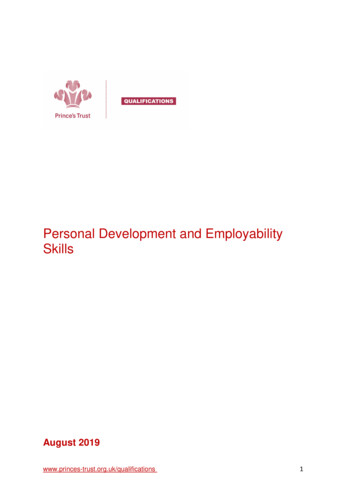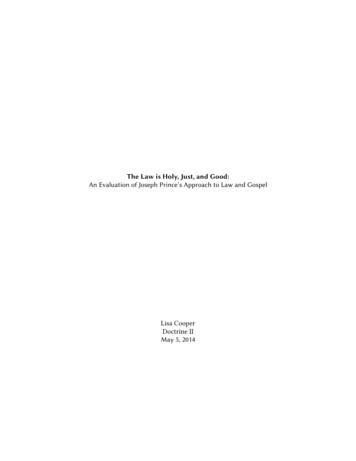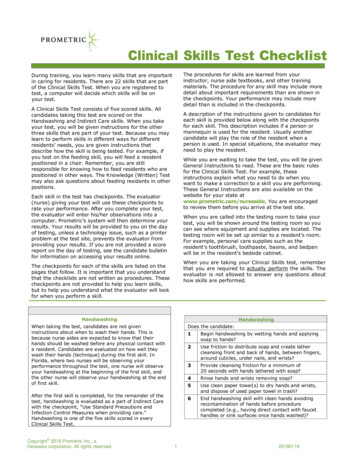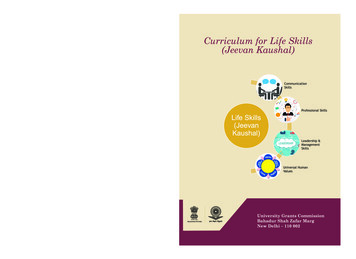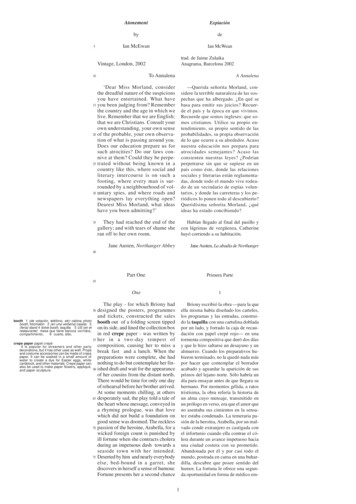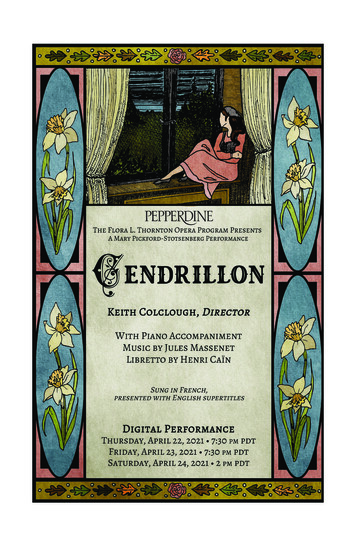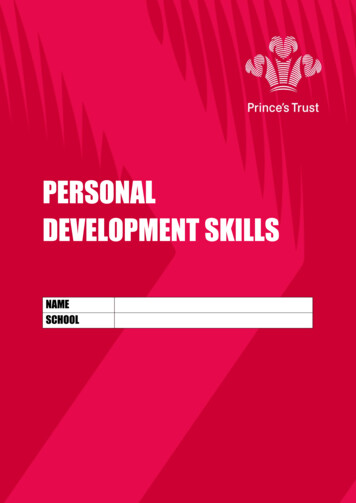
Transcription
#STARTSOMETHINGBEINSPIREDPERSONALDEVELOPMENT SKILLSNAMESCHOOL1
G OBJECTIVES .3WHAT ARE PERSONAL DEVELOMENT SKILLS? .3CASE STUDY .4ACTIVITY.4RESILIENCE .7SO, WHAT IS RESILIENCE? .7SELF-CASE STUDY .8ACTIVITY.8FAILURE .10SUCCESS DESPITE FAILURES .12SUCCESS DESPITE FAILURES (ANSWERS).13NEXT STEPS .14Alter .14Adapt .14Accept.14Avoid.14ACTIVITY.15FINAL THOUGHTS .17KEY POINTS .182
#STARTSOMETHINGBEINSPIREDLEARNING OBJECTIVES To understand personal development skills and be able torecognise these in ourselves and others. To learn how these skills contribute towards success in both ourpersonal and professional lives.WHAT ARE PERSONALDEVELOMENT SKILLS?Personal development skills are qualities and abilities that help you growin all aspects of life. Some examples of these skills are: CommunicationConfidenceAdaptabilityWork ethicLeadershipAnd many more!It is important to understand that personal development is a continuousprocess to improve all skills in life.3
#STARTSOMETHINGBEINSPIREDCASE STUDYACTIVITYHere you will find Nathan Jones, aka Mr Bag N Tag. Nathan is a Londonbased MMA fighter, who is currently the FURY, BCMMA and WFSWelterweight title-holder.Nathan has decided to share his story with you, so please watch thelinked video https://youtu.be/W-u70zJRVmw4
#STARTSOMETHINGBEINSPIREDWhat experience got Nathan into Martial Arts and how did he feelafter this happened?What are Nathan’s top 3 tips?1235
#STARTSOMETHINGBEINSPIREDTick the skills you feel Nathan has developed through his story? Confidence Resilience Leadership Decision making Adaptability Communication Work Ethic Motivation Problem Solving Willingness to learnWhat could have been a negative outcome of Nathan’s experience?We all go through both positive and negative life experiences, buthow we react to these situations will determine our own personalgrowth and development.6
#STARTSOMETHINGBEINSPIREDRESILIENCEFrom the previous case study, we can see that one of the biggest skillsNathan developed was his resilience.SO, WHAT IS RESILIENCE?Resilience is the ability to use tactics to overcome setbacks and achievegoals whilst staying positive.7
#STARTSOMETHINGBEINSPIREDSELF-CASE STUDYACTIVITYIn the box on the next page, write down a situation where you’ve neededto be resilient. (please draw on personal experience’s such as; a badsporting performance, not doing well in an exam, etc.)8
#STARTSOMETHINGBEINSPIREDHow did you feel in the above situation? (e.g. upset, angry, etc.)How did you react when this happened? (e.g. did you ask for help,what actions did you take, etc.)With the experience you have described, it is important tounderstand that these are individual to you. You may come acrosspeople with similar situations that have reacted; the same, better orworse than you. For that reason, you should seek advice fromothers if you feel comfortable, as this can give us a different way toconfront our problems.9
#STARTSOMETHINGBEINSPIREDFAILUREWe often see “failure” in a negative manor and something to avoid. But,is failure actually good for us?From the previous task you completed, the situation you originally foundyourself in, could well be deemed a failure. It is likely, that you wish youcould turn back the clock and make it never happen. However, how isthat actually good for us? And does that impact our personaldevelopment skills?Right click on the image below, to watch A-list Hollywood star, Will Smithdescribe our relationship with failure and how we should approach it:10
#STARTSOMETHINGBEINSPIREDUsing Will Smith’s video, tick the boxes next to the statements youagree with. We should seek failure. Successful people never fail. We must avoid failure. Failure helps you recognise where you need to improve. Practice is controlled failure. Successful people fail a lot. You can’t learn anything from failure. There’s no point in practicing.11
#STARTSOMETHINGBEINSPIREDSUCCESS DESPITE FAILURESMatch the famous faces to their setback stories below:Copy/Paste the correct text to the right person.A. At 22 was fired from a newspaper for “not being creative enough”.B. Told they were too emotional and not right for television.C. Rejected by 12 publishers before having their first book published.D. Removed from the company they founded at the age of 30.1.2.3.4.12
#STARTSOMETHINGBEINSPIREDSUCCESS DESPITE FAILURES(ANSWERS)1.C. Rejected by 12 publishers beforehaving their first book published.2.D. Removed from the company theyfounded at the age of 30.3.B. Told they were too emotional andnot right for television.4.A. At 22 was fired from a newspaperfor “not being creative enough”.13
#STARTSOMETHINGBEINSPIREDNEXT STEPSWhen it comes to learning how to overcome failure and develop ourpersonal skills, it is important to have a method/plan in how to deal withthis. Below you will find the 4 A’s Approach:Alter - What can you change to make the challenge easierto overcome? Think about the other skills you can use, likecommunication, problem solving and creativity. For example;rather than our sports team’s goal to be winning thetournament, maybe we alter it to every player gives 100%effort, with a long term goal of winning the tournament.Adapt - Are you being realistic? Do you need to adapt yourexpectations about how quickly you can achieve the goal orchange your approach? For example; if I get 20% in my test,maybe it’s unrealistic to expect 100% the following week, so Ishould adapt my target to be an increase of 20% each week.Accept - Understand that there might be setbacks that youcan’t deal with on your own – who might be able to supportyou? For example; after losing a game or competition, it’s okto accept the other team played better than us and to look atwhy they were successful, and therefore improve in thoseareas.Avoid - Think about what could stop you from overcomingthe challenge. If you tend to leave things to the last minute ornot, ask for help when you need it. For example; I know I needto study hard to pass my exams, but I easily get distracted bymy phone. I can avoid this distraction by putting my phone in aseparate room whilst I study.14
#STARTSOMETHINGBEINSPIREDACTIVITYNow go back to your Self-Case Study, and apply the 4 A’s Approach tosee how you could have changed your feelings and reaction to thesituation or apply these to a new scenario.Write down a situation where you might need to be resilient.15
#STARTSOMETHINGBEINSPIREDHow could you feel in the above situation?How would you react now to this situation?16
#STARTSOMETHINGBEINSPIREDFINAL THOUGHTSThank you for completing this booklet, and we hope it has helped youtowards taking the first steps the development of your personal skills.We would like to leave you with a couple of questions and a few points totake away in order to continue with your development.Why is it important we develop our resilience?What 3 tip’s will you takeaway from the two videos you’vewatched?12317
#STARTSOMETHINGBEINSPIREDKEY POINTS Personal Development Skills should be applied to all aspects ofyour life and you should never stop working on these. It is important to react positively to negative situations. You don’t need to go through difficult moment’s by yourself - Askfor help! It’s ok to fail, but use these opportunities to learn. Use the 4 A’sApproach to seek growth and develop.If you’ve been affected by any issues raised in this booklet, thefollowing organisations may be able to provide help and advice:Catch 22: s: https://www.samaritans.org/Mind: https://www.mind.org.uk/information-support/18
#STARTSOMETHINGBEINSPIRED19
#STARTSOMETHINGBEINSPIREDDSN 4055/2 The Prince’s Trust 2020 – all rights reserved. The Prince’s Trust is a registered charity, incorporated by Royal Charter(RC000772). Principal office: The Prince’s Trust South London Centre, 8 Glade Path, London, SE1 8EG. Registered charity number inEngland and Wales (1079675) and Scotland (SC041198).20
Personal development skills are qualities and abilities that help you grow in all aspects of life. Some examples of these skills are: Communication Confidence Adaptability Work ethic Leadership And many more! It is important to understand that personal development i

